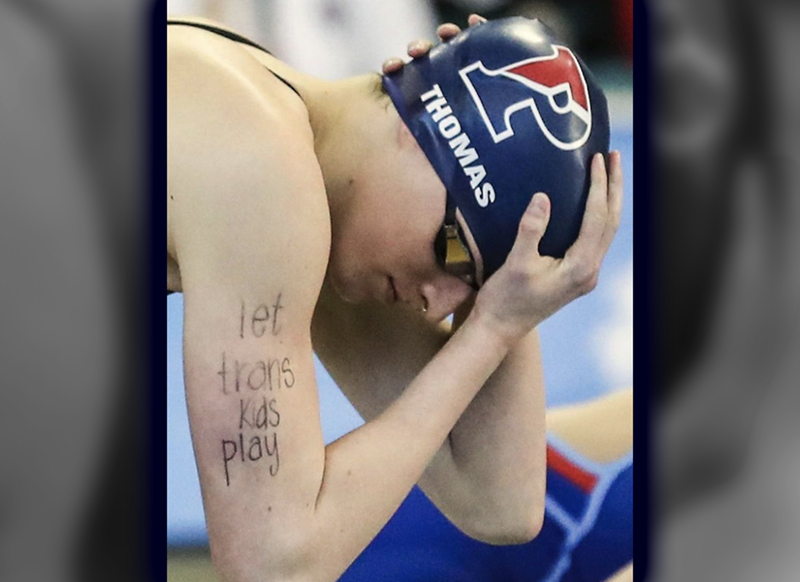USA Swimming unveils policy on elite transgender athletes
A panel of medical experts will determine whether trans athletes can compete based on physical development and testosterone levels.

USA Swimming, the national governing body for competitive swimming, has issued a new policy establishing new eligibility criteria for transgender athletes wishing to compete in elite events.
The policy, effective immediately, applies to USA Swimming athletes and approved elite events, and will remain in place until the release of an elite policy by FINA, the international governing body of aquatic sports, which will then supersede the policy. FINA is currently in the midst of developing its own guidelines and criteria to determine eligibility.
Under USA Swimming’s policy, transgender female athletes will have to go before a three-person panel of independent medical experts, who will determine whether the swimmer’s prior physical development as a man gives the athlete a competitive advantage over her cisgender female competitors. The swimmer must also provide bloodwork showing that the concentration of testosterone in her blood has been less than 5 nanomoles per liter continuously for a period of at least 36 months.
The policy does not mention anything specifically about transgender male athletes, although presumably a trans male would have to forego hormone therapy to remain on a team designated for women, as Yale swimmer Iszac Henig has. Ostensibly, the same guidelines for testosterone levels would apply to ensure that the trans male has not been taking hormones to give him a competitive advantage.
For trans males seeking to compete in men’s sports at an elite level, there are no specific guidelines to meet, medical tests to be subjected to, or panel to appear before for a the athlete to argue why they should be able to compete.
USA Swimming’s policy will apply to all transgender athletes seeking to compete in the 13-14 age group or older, and those who wish to set American records. However, transgender swimmers at the non-elite level will be permitted to compete “in a manner that is consistent with their gender identity and expression,” the policy states.
In announcing the new policy, USA Swimming said that the policy “acknowledges a competitive difference in the male and female categories and the disadvantages this presents in elite head-to-head competition,” pointing to statistics showing that the top-ranked female, on average, would rank 536th across 25-yard male events and 326th across 50-meter events in the country, among all USA Swimming members, to demonstrate the need for the policy.
USA Swimming was also compelled to issue the new policy after the NCAA, the governing body in collegiate sports, introduced a sport-by-sport policy in which transgender athlete participation must be determined by the policy set by each sport’s governing body, reports The Washington Post.
If a governing body had no policy, the sport would follow the relevant international federation’s policy. But FINA is currently in the midst of developing an updated trans participation policy, and the International Olympic Committee recently updated its policy by deferring to individual sporting bodies to develop their own eligibility criteria. That left USA Swimming with a policy where a trans athlete would appear before a review panel to make individual determinations on eligibility, but did not set specific guidelines regarding the concentration of testosterone in athletes’ blood.
The new policy also drops as social conservatives and women’s sports advocates have been clamoring for action to address the inclusion of University of Pennsylvania swimmer Lia Thomas in NCAA meets. Thomas previously competed for the men’s team for three years before undergoing a year of hormone therapy — as determined by the old IOC policy — during the 2020-2021 season, which was cancelled due to the COVID-19 pandemic. That then made her eligible to compete for the women’s team.
But since joining the women’s team, Thomas has broken several longstanding Ivy League records and has posted the fastest times of any female college swimmer in two events, leading other athletes to argue that her participation is unfair, with some observers even comparing the physical advantage she enjoys as akin to the advantage enjoyed by athletes who dope.
“USA Swimming has and will continue to champion gender equity and the inclusivity of all cisgender and transgender women and their rights to participate in sport, while also fervently supporting competitive equity at elite levels of competition,” the organization wrote.
Support Metro Weekly’s Journalism
These are challenging times for news organizations. And yet it’s crucial we stay active and provide vital resources and information to both our local readers and the world. So won’t you please take a moment and consider supporting Metro Weekly with a membership? For as little as $5 a month, you can help ensure Metro Weekly magazine and MetroWeekly.com remain free, viable resources as we provide the best, most diverse, culturally-resonant LGBTQ coverage in both the D.C. region and around the world. Memberships come with exclusive perks and discounts, your own personal digital delivery of each week’s magazine (and an archive), access to our Member's Lounge when it launches this fall, and exclusive members-only items like Metro Weekly Membership Mugs and Tote Bags! Check out all our membership levels here and please join us today!

























You must be logged in to post a comment.